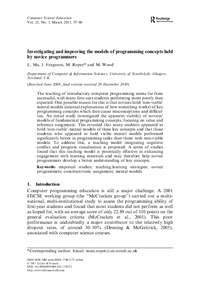Investigating and improving the models of programming concepts held by novice programmersLinxiao Ma, John D. Ferguson, Marc Roper, Murray Wood
Publikationsdatum:
Zu finden in: Computer Science Education 1/2011 (Seite 57 bis 80), 2011
|
 |
 Diese Seite wurde seit 1 Jahr inhaltlich nicht mehr aktualisiert.
Unter Umständen ist sie nicht mehr aktuell.
Diese Seite wurde seit 1 Jahr inhaltlich nicht mehr aktualisiert.
Unter Umständen ist sie nicht mehr aktuell.
 Zusammenfassungen
Zusammenfassungen
The teaching of introductory computer programming seems far from successful, with many first-year students performing more poorly than expected. One possible reason for this is that novices hold ‘non-viable’ mental models (internal explanations of how something works) of key programming concepts which then cause misconceptions and difficulties. An initial study investigated the apparent viability of novices' models of fundamental programming concepts, focusing on value and reference assignment. This revealed that many students appeared to hold ‘non-viable’ mental models of these key concepts and that those students who appeared to hold viable mental models performed significantly better in programming tasks than those with non-viable models. To address this, a teaching model integrating cognitive conflict and program visualisation is proposed. A series of studies found that this teaching model is potentially effective in enhancing engagement with learning materials and may therefore help novice programmers develop a better understanding of key concepts.
Von Linxiao Ma, John D. Ferguson, Marc Roper, Murray Wood im Journal Computer Science Education 1/2011 im Text Investigating and improving the models of programming concepts held by novice programmers (2011)  Dieser wissenschaftliche Zeitschriftenartikel erwähnt ...
Dieser wissenschaftliche Zeitschriftenartikel erwähnt ...
 Personen KB IB clear | Mordechai Ben-Ari , Jens Bennedsen , Michael E. Caspersen , Vashti Galpin , Tina Götschi , Kasper Dalgaard Larsen , Ian D. Sanders , Elliot Soloway , Jim Spohrer | ||||||||||||||||||||||||||||||||||||
 Aussagen KB IB clear | Programmieren ist schwierig | ||||||||||||||||||||||||||||||||||||
 Begriffe KB IB clear | Fehlvorstellungen / misconceptions
, Fehlvorstellungen beim Programmieren
, Fehlvorstellungen bezüglich Variablen
, Informatikcomputer science
, Informatik-Didaktikdidactics of computer science
, Informatik-Unterricht (Fachinformatik)Computer Science Education
, Konstruktivismusconstructivism
, notional machine
,  Programmieren Programmieren programming
, Programmierkonzepteprogramming concepts
, programming
, Programmierkonzepteprogramming concepts
,  Visualisierung Visualisierung visualization visualization
| ||||||||||||||||||||||||||||||||||||
 Bücher |
| ||||||||||||||||||||||||||||||||||||
 Texte |
|
 Dieser wissenschaftliche Zeitschriftenartikel erwähnt vermutlich nicht ...
Dieser wissenschaftliche Zeitschriftenartikel erwähnt vermutlich nicht ... 
 Tagcloud
Tagcloud
 Zitationsgraph
Zitationsgraph
 Zitationsgraph (Beta-Test mit vis.js)
Zitationsgraph (Beta-Test mit vis.js)
 Zeitleiste
Zeitleiste
 6 Erwähnungen
6 Erwähnungen 
- Visual Program Simulation in Introductory Programming Education (Juha Sorva) (2012)


- Teaching Python Programming to Novices - Addressing Misconceptions
and Creating a Development Environment (Tobias Kohn) (2017)


- ICER 2018 - Proceedings of the 2018 ACM Conference on International Computing Education Research, ICER 2018, Espoo, Finland, August 13-15, 2018 (Lauri Malmi, Ari Korhonen, Robert McCartney, Andrew Petersen) (2018)
- Programming Misconceptions for School Students (Alaaeddin Swidan, Felienne Hermans, Marileen Smit) (2018)


- Programming Misconceptions for School Students (Alaaeddin Swidan, Felienne Hermans, Marileen Smit) (2018)
- Proceedings of the 13th Workshop in Primary and Secondary Computing Education, WiPSCE 2018, Potsdam, Germany, October 04-06, 2018. (Andreas Mühling, Quintin I. Cutts) (2018)
- Thinking out of the box - comparing metaphors for variables in programming education (Felienne Hermans, Alaaeddin Swidan, Efthimia Aivaloglou, Marileen Smit) (2018)


- Thinking out of the box - comparing metaphors for variables in programming education (Felienne Hermans, Alaaeddin Swidan, Efthimia Aivaloglou, Marileen Smit) (2018)
- How Machine Learning impacts the Undergraduate Computing Curriculum (R. Benjamin Shapiro, Rebecca Fiebrink, Peter Norvig) (2018)


- Informatics in Schools. Beyond Bits and Bytes: Nurturing Informatics Intelligence in Education - 16th International Conference on Informatics in Schools: Situation, Evolution, and Perspectives, ISSEP 2023, Lausanne, Switzerland, October 23–25, 2023 (Jean-Philippe Pellet, Gabriel Parriaux) (2023)


- Investigating the Role of ChatGPT in Supporting Text-Based Programming Education for Students and Teachers (Markus Wieser, Klaus Schöffmann, Daniela Stefanics, Andreas Bollin, Stefan Pasterk)


- Investigating the Role of ChatGPT in Supporting Text-Based Programming Education for Students and Teachers (Markus Wieser, Klaus Schöffmann, Daniela Stefanics, Andreas Bollin, Stefan Pasterk)
 Anderswo finden
Anderswo finden
 Volltext dieses Dokuments
Volltext dieses Dokuments
 |  Investigating and improving the models of programming concepts held by novice programmers: Artikel als Volltext ( Investigating and improving the models of programming concepts held by novice programmers: Artikel als Volltext ( : :  , 813 kByte; , 813 kByte;  : :  2020-11-28) 2020-11-28) |
 Anderswo suchen
Anderswo suchen 
 Beat und dieser wissenschaftliche Zeitschriftenartikel
Beat und dieser wissenschaftliche Zeitschriftenartikel
Beat hat Dieser wissenschaftliche Zeitschriftenartikel während seiner Zeit am Institut für Medien und Schule (IMS) ins Biblionetz aufgenommen. Beat besitzt kein physisches, aber ein digitales Exemplar. Eine digitale Version ist auf dem Internet verfügbar (s.o.). Es gibt bisher nur wenige Objekte im Biblionetz, die dieses Werk zitieren.











 Biblionetz-History
Biblionetz-History